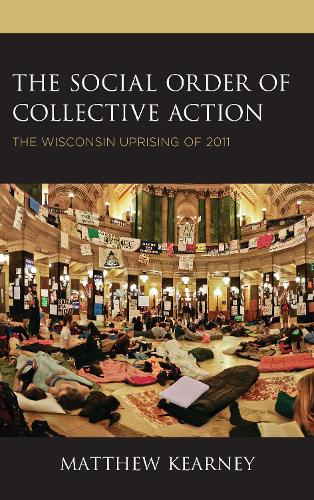
The Social Order of Collective Action: The Wisconsin Uprising of 2011
(Paperback)
Available Formats
Publishing Details
The Social Order of Collective Action: The Wisconsin Uprising of 2011
By (Author) Matthew Kearney
Bloomsbury Publishing PLC
Lexington Books
9th July 2020
United States
Classifications
Professional and Scholarly
Non Fiction
Central / national / federal government policies
Society and culture: general
303.48409775
Physical Properties
Paperback
274
Width 154mm, Height 217mm, Spine 20mm
408g
Description
The Wisconsin Uprising of 2011 was one of the largest sustained collective actions in the history of the United States. Newly-elected Governor Scott Walker introduced a shock proposal that threatened the existence of public unions and access to basic health care, then insisted on rapid passage. The protests that erupted were neither planned nor coordinated. The largest, in Madison, consolidated literally overnight into a horizontally organized leaderless and leaderful community. That community featured a high level of internal social order, complete with distribution of food and basic medical care, group assemblies for collective decision making, written rules and crowd marshaling to enforce them, and a moral community that made a profound emotional impact on its members. The resistance created a functioning commune inside the Wisconsin State Capitol Building.
In contrast to what many social movement theories would predict, this round-the-clock protest grew to enormous size and lasted for weeks without direction from formal organizations. This book, written by a protest insider, argues based on immersive ethnographic observation and extensive interviewing that the movement had minimal direction from organizations or structure from political processes. Instead, it emerged interactively from collective effervescence, improvised non-hierarchical mechanisms of communication, and an escalating obligation for like-minded people to join and maintain their participation. Overall, the findings demonstrate that a large and complex collective action can occur without direction from formal organizations.
Reviews
The Wisconsin uprising of 2011 was a struggle against the forces that would eventually unleash the politics of Donald Trump. In that sense, this period must be studied as a cautionary tale. But it is more than that. The vibrant protests against Governor Scott Walker's neoliberal extremism ushered in a new era of economic and social justice activism that would influence all the movements that will eventually shape a new politics and a new society. Matt Kearney recognizes all of these dynamics and his combination of on-the-ground reporting and deep scholarship makes this an essential book about a moment in history and the whole history of our times. -- John Nichols, The Nation, author, Uprising: How Wisconsin Renewed The Politics Of Protest, From Madison To Wall Street
Author Bio
Matthew Kearney received his PhD in sociology from the University of Wisconsin-Madison and postdoctoral training at McGill University.
